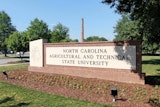Amid a flurry of plans for marches in Washington, D.C., grassroots organizers have set a date for a March for Science. The march will take place on April 22, coinciding with Earth Day. Organizers are encouraging others to conduct sister marches in cities across the nation.
So far, organizers behind the march have kept a low profile, but sent out a statement to news organizations last week saying that they were playing “catch up” as interest ballooned faster than expected. Three days after President Trump’s inauguration, organizers set up a Facebook group, which picked up more than 300,000 likes within days. A corollary group now has 800,000 likes.
Organizers had said that they would meet on January 28 to hash out details and craft a mission statement. The mission statement on the group’s website now reads, “The March for Science champions publicly funded and publicly communicated science as a pillar of human freedom and prosperity. We unite as a diverse, nonpartisan group to call for science that upholds the common good, and for political leaders and policymakers to enact evidence-based policies in the public interest.”
In the days after President Trump’s inauguration, many were concerned by the new administration’s apparent disregard for empirical truth. The administration’s first press conference was marked by attempts on the part of Trump press secretary Sean Spicer to convince journalists that Trump’s inauguration crowds were the biggest in history — a claim belied by photographic evidence and metro ridership comparisons —while another Trump spokesperson, Kellyanne Conway, heralded in the era of “alternative facts” on Sunday’s Meet the Press.
Many also perceive a threat to unfettered scientific endeavor during a Trump presidency. On the campaign trail, he espoused the idea that vaccines might be responsible for causing autism, a theory that has been debunked by the overwhelming majority of the scientific community.
Trump also promised to diminish the regulatory capacity of the Environmental Protection Agency (EPA). Although he has suggested that he is “open-minded” on the concept of climate change, his original transition team EPA chief pick, Myron Ebell, raised alarm bells for those concerned about climate change. While Ebell does not deny that greenhouse gases and human energy consumption have contributed to rising temperatures, he has suggested that global warming could be a boon for humanity and that it does not warrant a crisis response.
The groundswell of interest in the March from many diverse coalitions signals that this is a distinctive moment in history, said Dr. Joanna Radin, assistant professor of history of medicine and history at Yale University. “There’s a long history of scientists speaking out as public intellectuals, but I would say at least since the end of the Second World War, a lot of those moments have been about the misuse of science,” she said.
In the aftermath of World War II, scientists expressed concerns about the military-industrial complex, the misuse of nuclear power or the atom bomb, and other issues. Their activism culminated in the creation of groups like the Union of Concerned Scientists in the late 1960s.
“This is somewhat different,” Radin said. “This is a moment when wide swathes of scientists are coming together for a huge range of reasons that we don’t fully have a sense of yet, to speak out against a political regime.”
Yet as planning for the March goes forward, some have raised concerns about the framing of the March. In a New York Times op-ed, Dr. Robert S. Young, a professor of coastal geology and the director of the program for the study of developed shorelines at Western Carolina University, argued on Tuesday that a march could have the effect of making scientists appear to be a special interest group. He urged his fellow scientists instead to take part in civic action and to advocate with elected officials.
Staff writer Catherine Morris can be reached at [email protected].















